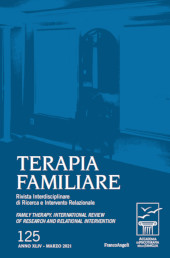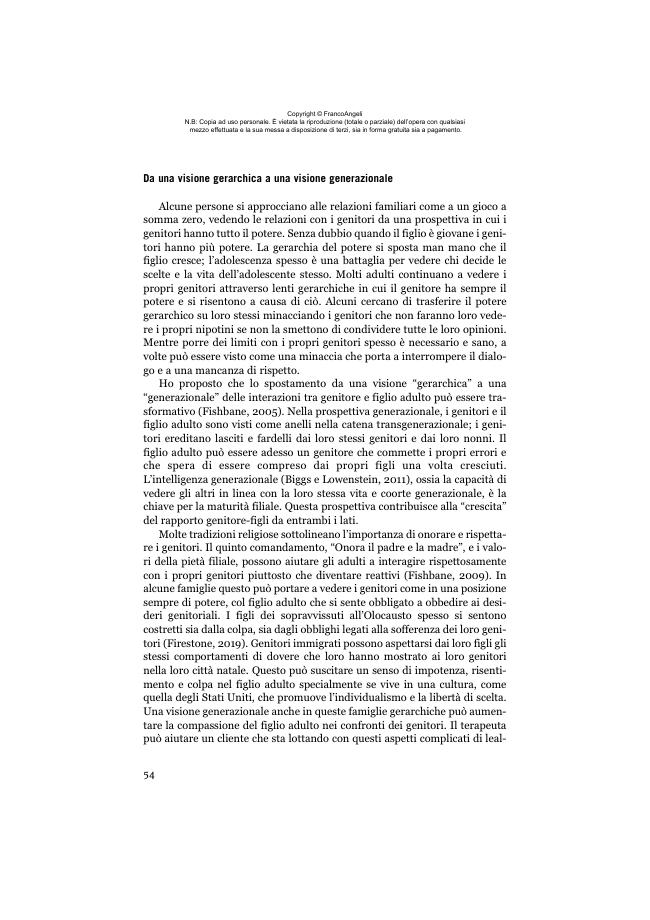Guarire le ferite transgenerazionali : un approccio relazionale e neurobiologico integrato
37-70 p.
Antichi risentimenti e problemi irrisolti con le famiglie di origine possono vincolare gli adulti nelle attuali relazioni con i genitori o fratelli e influenzare negativamente le relazioni con i partner o con i figli. Questo articolo intende esplorare le modalità tramite cui vecchie ferite vengono riattivate all'interno di relazioni attuali e come contribuiscano alla trasmissione transgenerazionale di eredità dolorose e traumi. Vengono proposti degli interventi clinici con clienti adulti per "svegliarsi dall'incantesimo dell'infanzia", curare ferite transgenerazionali, e maturare nuove relazioni con le famiglie di origine. Verranno esplorati i danni causati dalla colpevolizzazione dei propri genitori in terapia e ciò verrà messo in contrasto con l'enfasi che Ivan BoszormenyiNagy pone sulle azioni di ricongiungimento e sulla maturazione di risorse di fiducia nelle relazioni intergenerazionali.
La famiglia verrà considerata sia nel suo contesto culturale includendo gli effetti stressogeni e le risorse di resilienza sia nel contesto del ciclo di vita. In tutto il testo terremo in considerazione il tema dell'etica relazionale ovvero come possiamo vivere in accordo con i nostri valori e "raggiungere il meglio di noi stessi" nelle relazioni transgenerazionali. [Testo dell'editore].
Old resentments and unfinished business from the family of origin can constrain adults in current relationships with parents or siblings and negatively affect relationships with partners or children. This article explores how old wounds get reactivated in current relationships and contribute to the intergenerational transmission of painful legacies and trauma. Building on intergenerational family theory and interpersonal neurobiology, the dynamics of reactivity and pathways for growth are explored. While much of the time the human brain is on autopilot, driven by habits and emotional reactivity, we are capable of bringing prefrontal thoughtfulness and choice to close relationships. Rather than being victims of parents or our past, we can become authors of our own relational life. Interventions are offered to help adult clients "wake from the spell of childhood", heal intergenerational wounds, and "grow up" relationships with family of origin.
The damage caused by parentblaming in therapy is explored and contrasted with Ivan BoszormenyiNagy's emphasis on rejunctive action and cultivating resources of trustworthiness in intergenerational relationships. The family is considered both in its cultural context including stressors and resources for resilience and in its life cycle context. Aging in the intergenerational family is discussed, focusing on ways adult children and their parents can grow and flourish with the challenges at this time of life. Throughout, the theme of relational ethics how we can live according to our values and "reach for our best self" in intergenerational relationships informs the discussion. [Publisher's text].
Forma parte de
Terapia familiare : rivista interdisciplinare di ricerca ed intervento relazionale : 125, 1, 2021-
Artículos del mismo número (disponibles individualmente)
-
Información
Código DOI: 10.3280/TF2021-125003
ISSN: 1972-5442
MATERIAS
KEYWORDS
- ferite intergenerazionali, famiglia d'origine, eredità intergenerazionale, trasmissione intergenerazionale, neurobiologia interpersonale, transgenerazionale
- Intergenerational wounds, family of origin, intergenerational legacies, intergenerational transmission, interpersonal neurobiology, intergenerational



